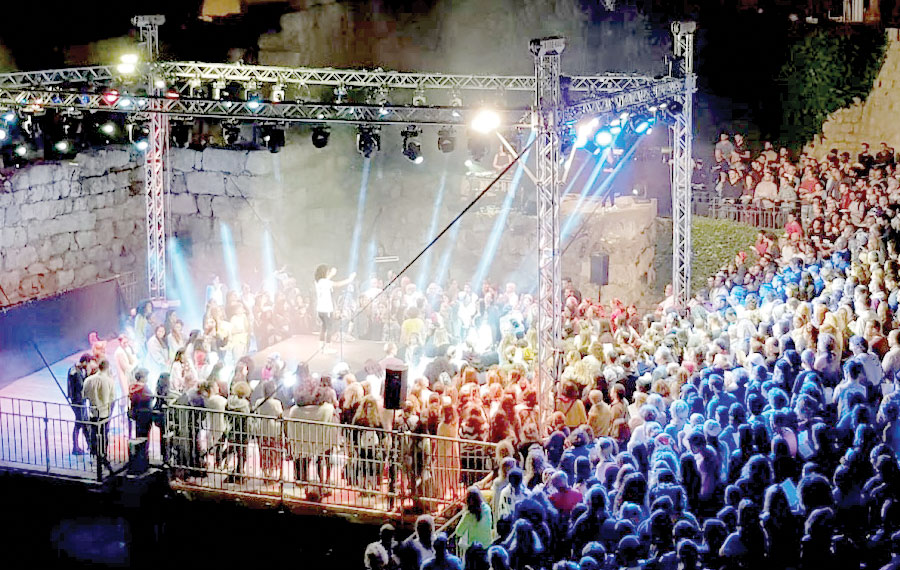 Photo by Ricky Rachman
Photo by Ricky Rachman Every morning, Or Taicher, one of the founders of Israel’s social flash mob-style sing-along craze Koolulam, opens his email in search of inspiration to start his day. A few months ago, a message sent by Shalhevet High School administrators did the trick.
“That’s the reason I’m here today,” Taicher told more than 200 Shalhevet students gathered in the school’s gymnasium the day before erev Yom Kippur. An online link led Taicher to a Koolulam-inspired video of Shalhevet’s student body, aided by live instrumentation, singing Matisyahu’s “One Day” in honor of Yom HaAtzmaut, Israel’s Independence Day.
“I was truly moved by what I saw,” he said. And that’s saying something.
Since kicking off in Tel Aviv last year, Koolulam — a play on the English word “cool,” the Hebrew words “kulam” (everyone) and “kol” (voice), and “kululu,” a festive ululation of Sephardic Jews — has soared in popularity throughout Israel. Thousands of tickets to take part in arena-filling Koolulam events are sold in minutes. Swaths of strangers come together … to sing.
Koolulam partners with nongovernmental organizations and local municipalities to reach every sect of Israeli society. To date, more than 100,000 people from diverse backgrounds have attended to learn musical arrangements (which take about an hour) and sing well-known songs in English, Hebrew and Arabic. The videos garner millions of online views, making Koolulam an international phenomenon.
During Taicher’s recent visit to Shalhevet, proceedings kicked off with 30 seconds of silence in honor of Ari Fuld, the American-Israeli terrorism victim who was stabbed in Gush Etzion on Sept. 16. The Shalhevet choir then sang “One Day” for Taicher before 17-year-old Lucy Fried interviewed him.
“It all started with curiosity,” Taicher said. “Two years ago, I saw a video of thousands of people praying at the Wailing Wall. I was so moved, so inspired. I asked myself, ‘How can I pass that along? How can I inspire others?’”
Taicher, a filmmaker, recalled brainstorming ways to help unify a fractured Israeli society marred by a lack of constructive political dialogue. He immediately considered the international language of music.
“I wanted to do something that could make connections instead of separating people,” he said. “This is how it began. I feel that music has a lot of power. It can open hearts and build bridges.”
Beyond bridging ethnic and religious divides in Israel, the mass singing sensation has proven to be a diplomatic tool. Earlier this summer, Kyai Haji Yahya Cholil Staquf, the secretary general of the world’s largest Muslim organization, Nahdlatul Ulama, which is based in Indonesia and has more than 60 million members, called Taicher on his cellphone and confessed to being a Koolulam fan.
“I wanted to do something that could make connections instead of separating people. This is how it began. I feel that music has a lot of power. It can open hearts and build bridges.” — Or Taicher
“I hung up. I thought it was a joke,” Taicher said. But it wasn’t. Taicher and his two co-founders, Ben Yefet and Michal Shahaf Shneiderman, set off to plan a truly majestic event for Staquf’s Jerusalem visit slated for mid-June. The 800 available tickets sold out in six minutes. The attendees included Muslim, Jewish and Christian leaders. The crowd convened at midnight in the courtyards of the Tower of David in the Old City of Jerusalem to sing Bob Marley’s “One Love” in English, Hebrew and Arabic (the Journal reported on this story in its June 29 edition).
Shortly after the Koolulam event, Indonesia, a country with no previous diplomatic ties to Israel, opened its borders to Israeli passport-holding tourists. “This showed me that what we’re doing, our movement, it’s working,” Taicher said.
He also noted that Koolulam receives Facebook messages from Arab fans around the world. Some even contain apologies for harboring unfounded hate of Israel.
Koolulam’s founders will receive the 2018 Asia Game Changer Award in New York next month, which Taicher called “an unbelievable honor.” Fellow honorees include the founder of the Syrian White Helmets and the Thai rescuers who saved a dozen teenage soccer players in a flooded cave earlier this year.
Ari Schwarzberg, Shalhevet’s dean of students, told the Journal that initiatives like Koolulam help frame conversations on Zionism divorced from politics.
“I think that the way our school views the value of Zionism, one of the ways we deeply feel it, is demonstrating that Israel has the great potential to be a place that models the best version of the Jewish people,” he said. “It gets complicated with politics. But this seemed to be one of those initiatives that represents the best of the Jewish people and a way to show our students and our community a way of deepening the understanding of what Zionism is.”
Taicher told the Shalhevet students it was an uphill battle to get Koolulam off the ground, saying he heard the word “no” a lot. “You can’t let it stop you,” he said. “Now we have over 100 people working for us and we’re making a change.”
He also spoke about Koolulam’s expansion plans, which he said may involve opening branches in Los Angeles, New York, South Africa and Abu Dhabi. A South African event is scheduled for November.
“It was really cool to get a chance to talk with [Taicher],” Fried said following the discussion. “It’s really inspiring that he created something so powerful despite all the rejection he faced.”
Many Shalhevet students expressed interest in attending a potential future Koolulam event in Los Angeles. Tobey Lee, 16, told the Journal the idea sounded fun, but it’s not the singing he’s drawn to.
“Koolulam is something bigger than just singing a song,” he said. “It’s creating something bigger than music. It’s really cool that it’s creating peace.”






















 More news and opinions than at a Shabbat dinner, right in your inbox.
More news and opinions than at a Shabbat dinner, right in your inbox.